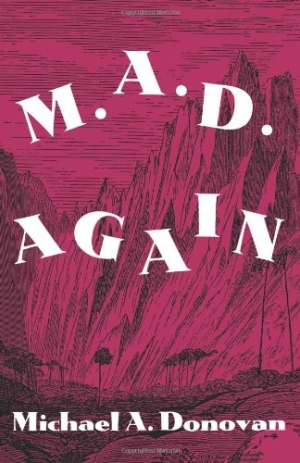It looks like you've stumbled upon a page meant to be read by our code instead of viewed directly. You're probably looking for this page.
M.A.D. Again
Donovan skillfully depicts Poe-esque imagery through eerie poetry.
Poet Michael A. Donovan offers striking images and an interesting perspective on the trials of life in his collection M.A.D. Again. With an eclectic referential soundtrack that includes The Eagles, Boston, and Guns N’ Roses, Donovan explores dark moments through poetic rhythms and forms that sometimes contradict the musicality the poet attempts to infuse throughout his work.
Not afraid of the macabre, Donovan crafts lines that ring with eeriness. In the collection’s first poem, “Cold River,” he writes, “The bridge with moss-filled initials like a funeral home’s sign-in log. / The bloody white rock below is blackened by the current’s aftermath,” setting an appropriate tone for the rest of the work. Another early poem, “Your Wish,” is narrative rather than descriptive, but placed in context with the book’s first dark moments, it reads chillingly: “When you tilted your head back, / And made that wish on your necklace, / What I felt was some sort of impact.”
Not surprisingly, Donovan names Edgar Allan Poe as one of his primary influences, a fact that permeates a majority of his pieces. There are nightmarish moments that stereotypically emulate Poe, as when Donovan writes, “Lit gas-filled candles start to blister your skin.” But the poet also plays with oddness and dread in imaginative ways, most notably in the short poems “Good Home” and “Local Corner,” which contain images like a “Birch-tree casket, / With a looking-glass picture of Marilyn Monroe” and a “Pacman-shaped tree, / Playing hangman with a traffic light,” respectively.
The book gets bogged down, however, under the weight of restrictive choices in form and rhyme scheme. In nearly every poem, each line reads like a sentence, with first letters capitalized and consistent end punctuation. In addition, an abab rhyme scheme is the norm throughout—though Donovan does play with imprecise rhyme, as in “reason” and “freezing” or “time” and “dine.” The result is poems that tend to run together; there is little variation in the collection, and though this conveys a clear voice, it can also be monotonous. Breaking free from the shackles of consistency through greater experimentation with form and rhythm would give this poetry greater resonance.
Music and bad love also make appearances here. “Doesn’t Seem Fair” combines the two, with lines like “Motley Crew’s [sic] ‘I Need You’ the perfect line, / Backed up by the Eagles’ ‘Wasted Time,’” and “You were sleeping our memory away, / It was the last I love you that I could say.” The speaker of most of the poems shares tortured thoughts—about relationships ending, childlessness, and paranoia. At times, such earnestness feels heavy-handed.
M.A.D. Again would benefit from clearer, more organized back cover material that includes an author biography. As it is, the confusing blurbs on the back do little to reach out to readers. The primary strength of this book, though, is Donovan’s knack for rendering Poe-esque images for the present day.
Reviewed by
Margaret Fedder
Disclosure: This article is not an endorsement, but a review. The publisher of this book provided free copies of the book and paid a small fee to have their book reviewed by a professional reviewer. Foreword Reviews and Clarion Reviews make no guarantee that the publisher will receive a positive review. Foreword Magazine, Inc. is disclosing this in accordance with the Federal Trade Commission’s 16 CFR, Part 255.
